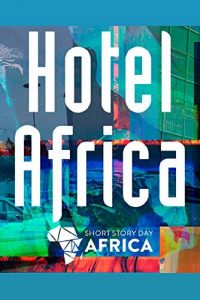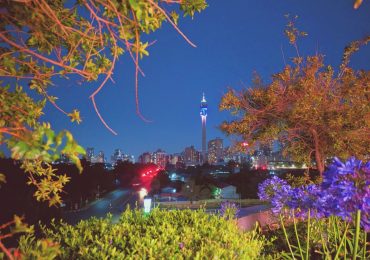Egyptian writer Adam El Shalakany has won the 2018 Short Story Day Africa Prize for his story ‘Happy City Hotel’—becoming the first-ever winner from North Africa.
‘Mr Thompson’, by Kenyan writer Noel Cheruto, took second place, while ‘The Space(s) Between Us’, by South African writer Lester Walbrugh, was placed third.
The prestigious prize is worth $800 (about R10,800) and open to any African citizen or African person living in the diaspora.
Prize organisers called this year’s judging ‘almost impossible’, adding that this was ‘the closest competition yet seen in SSDA’s history’.
Four stories were highly commended by the SSDA judges: ‘Why Don’t You Live in the North?’ by Wamuwi Mbao (who is an Editorial Advisory Panel member and regular contributor to The JRB), ‘Slow Road to the Winburg Hotel’ by Paul Morris, ‘Outside Riad Dahab’ by Chourouq Nasri, and ‘The Snore Monitor’ by Chido Muchemwa.
This year’s prize theme was ‘Hotel Africa’, and Short Story Day Africa was seeking ‘innovative short fiction set in the rooms, the passages, the bars and the lobbies of hotels across the continent, as well as metafiction exploring Africa as a hotel herself. If these walls could talk, what story would they tell?’
- Buy the Hotel Africa anthology here (coming soon in paperback)
All twenty-one stories that made the 2018 SSDA longlist are published in the prize’s anthology, Hotel Africa: New Short Fiction from Africa. The collection was edited by Ope Adedeji, Anne Moraa, and Agazit Abate, with mentors Helen Moffett and Karen Jennings, as part of the SSDA Editing Mentorship.
Read Short Story Day Africa’s announcement:
As we explained in our (long) shortlist announcement, choosing winners for the 2018 Short Story Day Africa award was almost impossible, and not just in the usual sense—how to choose between a crisp apple and a sensually scented orange—but in terms of the democratic voting system adopted by the judges, which led to the closest competition yet seen in SSDA’s history.
Having so many closely matched and high-quality stories is an excellent outcome, of course; but it did make choosing a shortlist and the winners a far more onerous task than usual. We broke the deadlock by pressganging an additional judge into providing three extra votes, and this is how, by a whisker, Adam El Shalakany’s ‘Happy City Hotel’ took the winner’s place, nudging Noel Cheruto’s ‘Mr Thompson’ into second place, while Lester Walbrugh’s ‘The Space(s) Between Us’ was established as holder of the third spot. We congratulate these authors sincerely and enthusiastically while once again noting that this competition was the tightest we’ve yet seen; if this had been a horse race, we would have had to call for a photo finish.
We are especially delighted to have the length of the continent represented by the top three stories. Given our commitment to featuring literature from all over Africa, which has to be juggled with practical and financial constraints that mean we can only accept submissions in English, we are very pleased that the winning story is our first-ever winner from Egypt (and North Africa, in fact). It’s hard to explain the charm of this story, which features a small and shabby hotel in Cairo, and a cast of strangely endearing characters, but everyone who read it said it made them ‘happy’; which, given that it features very ordinary people living somewhat melancholy lives, is testament to how deeply it resonates with the reader.
Noel Cheruto represents Kenya with her moving story of the dashed dreams of a hotel worker who silently confesses all to a guest. This rich and subtle piece, in which wit and compassion are skilfully blended, was extremely popular with the judging panel. And South Africa’s Lester Walbrugh, who was shortlisted in last year’s anthology, provides one of the most original and haunting versions of a ‘romantic getaway’ at a fancy hotel you’ll ever read.
The following stories are particularly highly commended (they all featured in the photo finish): ‘Why Don’t You Live in the North?’ by Wamuwi Mbao, ‘Slow Road to the Winburg Hotel’ by Paul Morris, ‘Outside Riad Dahab’ by Chourouq Nasri, and ‘The Snore Monitor’ by Chido Muchemwa.
Mbao’s story is a subtle meditation on the landmarks, both inner and outer, that colonial histories leave, while Morris’s is a deceptively simple account of a journey to a hotel that has a double twist at the end. ‘Outside Riad Dahab’, a particularly moving account of contact between outsiders and insiders, describes the interaction between a privileged hotel guest and the homeless man who camps outside the building. And ‘The Snore Monitor’, in which a young Zimbabwean woman has a most unusual job in a South African hotel, also explores the theme of fleeting contact between wealthy tourists and those who are obliged to care for them.
We heartily congratulate the winner and runners-up once again, and close with the truism that the real winner is African literature, with this exceptionally fine selection of stories.
Ends
Since being founded by author Rachel Zadok in 2011, Short Story Day Africa has published seven anthologies and 122 writers. It has also helped nurture the talent of a number of writers who have gone on to win or be shortlisted for some major awards, including the Short.Sharp.Stories Prize, the Commonwealth Writers Prize, the Caine Prize for African Writing, the African Speculative Fiction Society NOMMO Awards, the Brittle Paper Awards, and others.
Just recently, 2018 SSDA finalist Cherrie Kandie and winner Tochukwu Emmanuel Okafor were announced on the five-writer shortlist for the prestigious Caine Prize.
And if you are a budding writer, the Short Story Day Africa is currently open for submissions! This year’s theme is ‘Disruption’.
About the Hotel Africa anthology
For this sixth collection of stories seeking the most innovative writing emerging from the continent, Short Story Day Africa asked for stories of Africa’s hotels: grand and shabby, real and imaginary, pulsating with life and abandoned. Here, it’s not just the walls that speak (and weep); the corridors, kitchens, lobbies, bars and beds all have stories to tell. But none more so than the array of characters jostling each other across these pages: tourists, cleaners, children, beggars, honeymooners, cooks, soldiers, those travelling hopefully.
Check in to meet captive maternal progenitors, a dragon-breathed gangster, a herd of mystical donkeys, competing chefs, a prosperity pastor, and more.
Check in to read stories of anonymous hookups, the pitfalls of nostalgia, surviving a colonial past, imagining astonishing futures.
Check in to hear a chorus of irresistible voices—from Cameroon to Zambia, from Egypt to Malawi.






